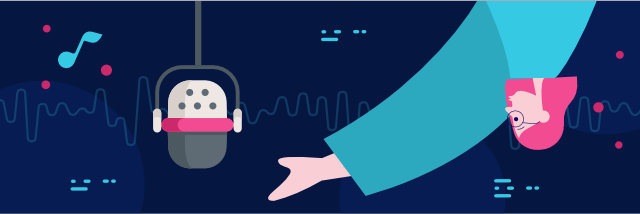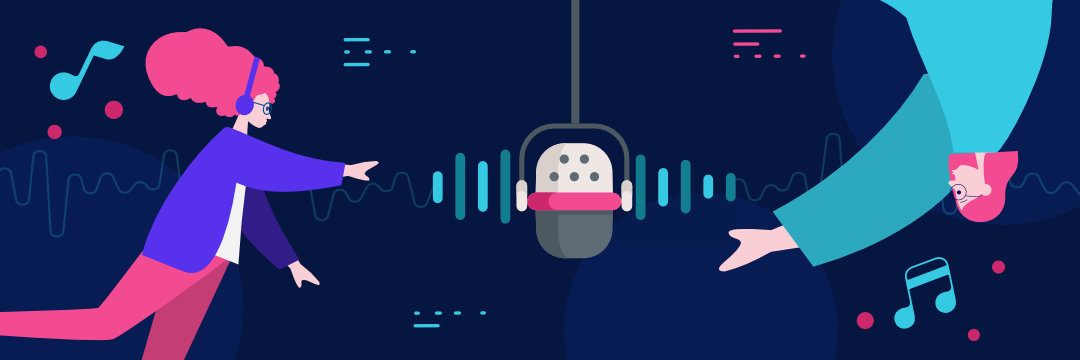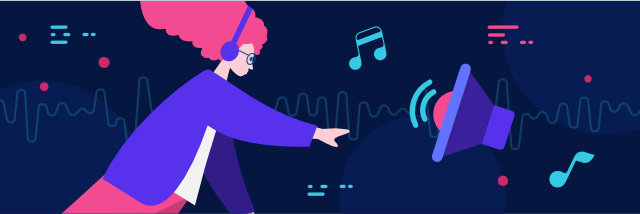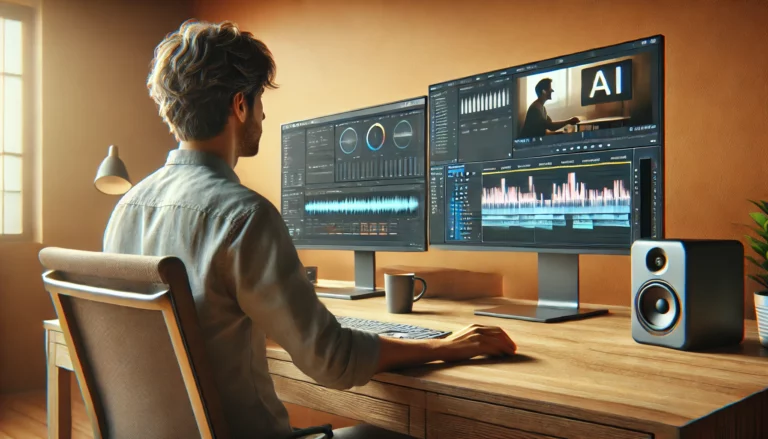Every audiophile’s dream is to hear a seamless, immersive sound. So get ready because knowing how to make 3d audio can give you this amazing experience.
In a way, you already have access to this type of audio. It’s simply a way of describing how you normally hear sounds. Soundwaves hit your ears at varying times and volumes, and this information is processed by your brain to determine the origin of the noise. That’s how you can tell how close the sound is even if you close your eyes.
But while this may be the way you normally hear, it’s not how you listen to the dialogue in movies or your favorite songs. For instance, when you put on headphones or earbuds, the device places the soundstage in the middle of your head. But 3D audio works in the exact opposite way. It is optimized to recreate the perception of distance even if you’re wearing headphones to make your audio experience much better and more realistic.
3D sound will be one of the next big trends. PS5 has featured it in their events, and it’s even making a buzz in the parenting world.
What Is 3D Audio?
3D audio is also called binaural audio. This type of audio is meant to let you hear sounds as if they are happening around you instead of coming out of your speakers or headphones. If the sound comes from the right, you’ll hear it louder in your right ear, and it takes a fraction of a second longer before it reaches your left ear. This barely noticeable change is what makes your experience unique.
With this highly immersive sound, everything is easily recognizable whichever direction it’s coming from – far in front, behind, and even below.
History of 3D audio
Before you learn how to make 3d audio, you first have to know about its history. You may be thinking that if you’re only hearing about 3d audio now, it’s probably a new discovery. However, it’s not new at all.
3D audio was first utilized in the late 19th century in France through a Theatrophone, a device that looks like horn-style telephones held on each ear. This plays recorded concerts and plays through a series of transmitters that are connected to the stage. America caught wind of this technology in 1933 and made the first-ever binaural demo. It was even the most popular attraction in the Chicago World’s Fair.
As more companies learn how to make 3d audio effects, it has become more popular. Brands that started to use it through the years include BBC radio in 1978 and Disney World in 1995. Pearl Jam even released a 3D audio song called Binaural.
For many years, 3d sound was treated as a novelty, and many musicians and people in the gaming, movie, and entertainment industries overlooked the technology in favor of less demanding methods. Now, the rise of virtual reality hardware has caused 3d sound to increase in popularity since VR systems are dependent on this realistic audio experience to fully immerse their users.

3D Audio vs. Surround Sound
Surround sound was invented to change the way you experience entertainment. Its secret lies in an array of speakers that are placed around the room to give you a multidimensional atmosphere. The idea is to have entertainment media such as movies, concerts, and sports games come to life. It can also be used in outdoor attractions, exhibitions, conferences, and meditation.
Unlike surround sound, 3D sound is not meant to be used for large spaces like a movie theater. It is optimized for headphones, which help create a feeling of distance.
Although the two methods differ, they also have similar uses. Surround sound uses multiple speakers around a room to put viewers at the center of the action. This makes activities like watching movies and television better. Just like 3D Sound, surround sound also does wonders in enriching the sound quality of an audio source. But with 3D sounds, the sound does not only come from behind or left, or wherever a speaker is located. It can also come from below and above. This enhances the sound quality even more.
How they differ with video games
When you take surround sound and use it to say, improve someone’s experience while playing video games, the sound is sent to both ears instead of either the right or left ear, and the speakers interfere with the signal each ear should experience.
With 3d sound, playing video games with headphones will make the sound seem like it’s coming from the outside world, and not from the device. The sound is transferred directly into the auditory canal without reaching the head, body, and outer ear. Considering this, 3D sound can be produced from any direction, and it can even reproduce the sounds clearly while the player is traveling around an obstacle.
So if video game players are approached by an enemy on the left side, they can hear the character coming from that same direction. Although surround sound can also produce sounds from different directions, it won’t change according to what the listener is seeing or doing in the video game.
With 3D sound, one feels as if they are right in the middle of the action in a virtual world without the sound coming at them from every direction in the room. This makes 3D sound the clear winner.
How Does 3D Audio Work?
Traditional recordings use two methods – mono and stereo. Mono uses one microphone to pick up the sound, while stereo uses two microphones that are spaced from each other.
Binaural recording improves the stereo method by placing the microphones in ear-like cavities of a dummy head or a stand. Because the dummy recreates the shape and density of a real person’s head, the microphones are able to preserve the interaural cues and capture and process the sound exactly as it would be when heard by human ears.
This may seem like a very simple concept, but when used with good microphones and played in high-quality headphones, 3D audio brings a very realistic effect by fooling the brain into believing it hears the sound firsthand.
How to Make 3D Audio
Binaural beats are useful for a variety of reasons that include studying, working, meditating, or boosting one’s creativity level. If you are interested to know how to make 3d audio Audacity to serve as an accompaniment to your company videos, you’re about to find out.
First, download Audacity. This is a free and easy-to-use audio editor. When your software is ready, you need to generate a base tone. This range is usually between 100 to 200 Hertz depending on the desired waves you want to produce. To do this, click Generate, then Tone, and type in the frequency and duration you want.
Next, you need to keep the left and right audio separated. This is the secret to making 3d audio work. To do this, select the drop-down arrow of the new audio track and click Left Channel.
To generate the second tone, repeat the previous base tone steps, and set the frequency higher or lower than your base tone. During this process, make sure you deselect the first audio track. Simply click away from it before you generate the second tone. There should be a second grayed out track before you click OK. To create the right stereo track, repeat the previous steps, but select the right channel.
Now, you’re all done. To finish your 3D audio, turn it into an mp3 by clicking File, and then Export Audio. Name the finished product and set the audio quality to whatever you please, but ensure channel mode is set to stereo, not joint stereo. Learning how to make 3d audio isn’t as hard as you once thought, right?

Benefits of 3D Audio
Binaural audio has become the sound of choice for many purposes. Here are some reasons why you should try it.
Authentic experience
You may think that a huge TV screen is all you need to watch concerts, sports games, and movies, but it’s the sound that makes you feel as if you’re truly part of the venue. 3D sound does wonders in bringing any vision to life. A 3D sound headphone can deliver the audio based on where it’s coming from, so you will hear every individual instrument and dialogue in a video in the best way possible. If you’re watching a live event, you’ll even hear the crowd cheering as if you’re really there.
Improved sound quality
Many people think that listening to 3d audio is a luxurious experience, but it’s actually not as extravagant as you think. Thanks to modern technology, accessing 3d audio is now easier than ever.
When you listen to 3d audio, you are sure that the sound quality is specific to your taste. You do not even have to change your positioning since you can get amazing sound clarity wherever you are in the room. It’s truly a game-changer.
Great for games and movies
Can you imagine heading to a cinema just to play your favorite video game? The sound would be amazing, right? Well, you could hear a better sound right in your home, thanks to 3d audio. Think about it, part of the reason why you go to the cinema is that you want to hear every sound in detail. While this benefit is great, paying for the experience every single time can be draining.
With 3d audio, you can get a crisp and realistic sound of voice-overs wherever you are. So depending on the film you’re watching, your room may feel like a horror house or a war zone. Every single explosion or footstep will sound like it’s happening right where you are. You can even laugh at your favorite dialogue without drowning out the characters because there won’t be any need to turn the volume up unnecessarily.
No distractions
Imagine trying to listen to your favorite song while your roommate talks loudly on the phone or while your dog is barking incessantly. These sounds can ruin your experience. Listening to 3d audio on a good pair of headphones will drown out unwanted sound and allow you to be immersed in whatever you are listening to.
One Last Thing: Binaural Beats
3d audio is not just for events, songs, and movies. In recent years, binaural beats have started to gain traction. This is because of its ability to help reduce anxiety and to improve focus, mood, attention, and memory. Binaural beats also work well in helping people get into a meditative state and have better sleep quality.
3D Audio Is the Next Big Marketing Tool
In more ways than one, 3D audio works similarly to an optical illusion. But instead of fooling your eyes, it fools your ears. More companies now want to make 3d audio because it can be extremely beneficial when incorporated into content strategies, especially in social media. For instance, it can bring people to an event that’s happening across the globe and make them feel like they’re there.
Every day, consumers watch loads of dull ads and content. 3D audio allows you to steal people’s attention in a way unlike any other through audio ads. If you need help in learning how to make 3d audio, contact the team of experts at Bunny Studio.










